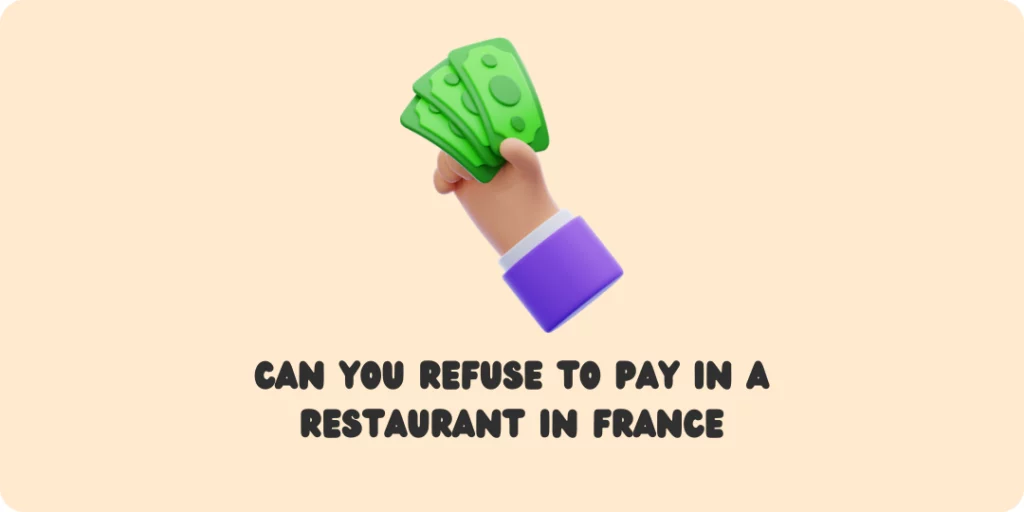
QR code engraving: making your choice
Hi everyone! 🌟 Have you ever considered the impact an
Le rédacteur en chef
👨🍳

Going to a restaurant is often a taste adventure, a moment of shared pleasure over a good meal 🍴✨. Yet sometimes this quest for culinary bliss can run into unexpected obstacles. Faced with a disappointing experience, the thorny question arises: ‘Can you refuse to pay in a restaurant in France’?
This article explores this complex issue, setting out the rights and duties of everyone involved in this gastronomic ballet. Armed with knowledge and understanding, let’s navigate these sometimes murky waters together to see things more clearly 🚢🔍.

When you walk through the door of a restaurant in France and order, a consumer contract is formally established between you and the establishment. This contract, enshrined in the Consumer Code, seals your commitment to pay in exchange for the food and services provided. But the law is never black and white, and there are important nuances to consider. For an in-depth understanding of contractual obligations, I strongly recommend that you consult the Service Public website, which sheds light on the compulsory information in this type of contract.
The non-performance exception is a legal principle that allows payment to be refused if the service provided does not live up to the promises made. This can manifest itself in various ways: a dish that does not conform to its description, questionable hygiene conditions, or a service that is clearly unsatisfactory. This is a valuable consumer right, but it must be exercised with discernment and fairness, to avoid abuse.
Non-conformity and poor quality: If the meal served differs significantly from what was promised or has hygiene problems, you are entitled to lodge a complaint.
Unsatisfactory service: Long waits, repeated mistakes when ordering, or an unwelcoming welcome can spoil the restaurant experience.
Unjustified price: When the final bill seems disproportionate to the quality and quantity of the services received.
In each of these situations, it is essential to approach the problem with the restaurant staff in a respectful and constructive manner, first seeking an amicable resolution.
Refusing to pay without a valid reason or without having tried to resolve the problem amicably can have serious repercussions, ranging from legal action to being banned from the establishment.
The restaurateur, for his part, has the right to insist on payment for services rendered. When faced with a dispute, it is often in everyone’s interest to opt for an amicable resolution, as this helps to maintain a good reputation and build customer loyalty.
‘Can you refuse to pay in a restaurant? The answer is nuanced. Yes, in certain well-defined and justified situations, but always within a framework of mutual respect and good faith. Before reaching such an extreme, communication and the search for an amicable solution should always be favoured. In this way, every restaurant outing can remain what it should be: a source of pleasure and discovery.
If you’re intrigued by the world of catering and want to refine your knowledge, feel free to explore our article on ‘Important key words for catering’, where you’ll find valuable information to enrich your culinary experience.
Le rédacteur en chef
👨🍳
Going to a restaurant is often a taste adventure, a moment of shared pleasure over a good meal 🍴✨. Yet sometimes this quest for culinary bliss can run into unexpected obstacles. Faced with a disappointing experience, the thorny question arises: ‘Can you refuse to pay in a restaurant in France’?
This article explores this complex issue, setting out the rights and duties of everyone involved in this gastronomic ballet. Armed with knowledge and understanding, let’s navigate these sometimes murky waters together to see things more clearly 🚢🔍.

When you walk through the door of a restaurant in France and order, a consumer contract is formally established between you and the establishment. This contract, enshrined in the Consumer Code, seals your commitment to pay in exchange for the food and services provided. But the law is never black and white, and there are important nuances to consider. For an in-depth understanding of contractual obligations, I strongly recommend that you consult the Service Public website, which sheds light on the compulsory information in this type of contract.
The non-performance exception is a legal principle that allows payment to be refused if the service provided does not live up to the promises made. This can manifest itself in various ways: a dish that does not conform to its description, questionable hygiene conditions, or a service that is clearly unsatisfactory. This is a valuable consumer right, but it must be exercised with discernment and fairness, to avoid abuse.
Non-conformity and poor quality: If the meal served differs significantly from what was promised or has hygiene problems, you are entitled to lodge a complaint.
Unsatisfactory service: Long waits, repeated mistakes when ordering, or an unwelcoming welcome can spoil the restaurant experience.
Unjustified price: When the final bill seems disproportionate to the quality and quantity of the services received.
In each of these situations, it is essential to approach the problem with the restaurant staff in a respectful and constructive manner, first seeking an amicable resolution.
Refusing to pay without a valid reason or without having tried to resolve the problem amicably can have serious repercussions, ranging from legal action to being banned from the establishment.
The restaurateur, for his part, has the right to insist on payment for services rendered. When faced with a dispute, it is often in everyone’s interest to opt for an amicable resolution, as this helps to maintain a good reputation and build customer loyalty.
‘Can you refuse to pay in a restaurant? The answer is nuanced. Yes, in certain well-defined and justified situations, but always within a framework of mutual respect and good faith. Before reaching such an extreme, communication and the search for an amicable solution should always be favoured. In this way, every restaurant outing can remain what it should be: a source of pleasure and discovery.
If you’re intrigued by the world of catering and want to refine your knowledge, feel free to explore our article on ‘Important key words for catering’, where you’ll find valuable information to enrich your culinary experience.

En répondant à 3 questions, obtenez un audit complet 💯 de votre présence en ligne ✨

Hi everyone! 🌟 Have you ever considered the impact an

Wondering how the Google Business Profile ranking works? 🤔 You’re

In today’s digital world, Google reviews play a crucial role.

Hi everyone! 🌟 Have you ever considered the impact an

Wondering how the Google Business Profile ranking works? 🤔 You’re

Hi everyone! 🌟 Have you ever considered the impact an

Wondering how the Google Business Profile ranking works? 🤔 You’re
